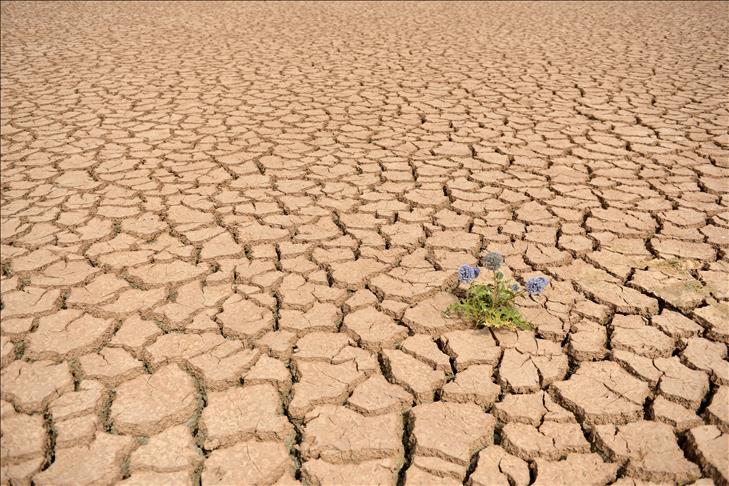Drought becomes new normal in Pakistan's Thar desert
Experts say climate change makes extreme weather common in Pakistan but country has no environment policy

By Aamir Latif
KARACHI, Pakistan
Already shaken by three years of consecutive drought, the people of Pakistan's Thar desert will have to brace for yet another dry year.
Experts fear the disappointing rain forecast will force a mass migration from the desert, with Thar dwellers already making preparations to move to adjoining irrigated towns because the rains will not support their cluster bean crops and fodder for their livestock.
The desert's annual rainfall is 250mm, according to senior Pakistan Meteorological Department official Abdul Rasheed, but 230mm of that comes in the current monsoon season and is, for the fourth year in a row, unlikely to materialize.
“Light to moderate rains are expected in the entire southern region, including Thar, in the coming few days. But after that, we do not see any other system that can cause rainfall in Thar in the near future,” Rasheed told Anadolu Agency. "If this is the case, then the [drought] situation can be grave.”
While the Tharis have been able to struggle through previous droughts, each year makes the situation more desperate and now many of their traditional go-to sources of water have gone dry. A famine sparked by drought killed close to 200 people in Thar last year.
The desert, which forms a natural boundary with neighboring India, spans a region of 200,000 kilometers, has a population of 1.5 million and is ranked by the World Food Program as the most food insecure region in the country.
“Quite surely, this is because of climate change or global warming,” Abdul Rasheed said. “This [climate change] has increased the frequency of extreme weather patterns in the country, due to which, in some parts you see super floods and massive rains but in some parts, like Thar, you see low rainfall and drought."
In stark contrast to Thar, authorities have issued flood warnings in north Pakistan where 200 villages have been inundated and thousands of people displaced.
Last month, more than 1,000 people were killed by a searing week-long heatwave that was particularly deadly in the densely-populated southern port city of Karachi.
Despite the warnings from experts, many believe neither the provincial Sindh government that governs Thar, nor the federal government, have taken the issue of climate change seriously.
"The biggest challenge of the 21st century is climate change. Unfortunately, Pakistan is not taking this very important issue as seriously as required," Islamabad-based environmentalist Dr. Qamar-uz-Zaman told Anadolu Agency. "If the ongoing situation continues, Pakistan will face an acute shortage of irrigation and underground water."
Zaman, a former head of the Pakistan Meteorological Department, said any future developments have to be made resistant to climate change to make them effective.
The focus has been on humanitarian assistance, infrastructure development and other short-term measures but the government has not made an effective long-term policy on climate change, according to Pakistan's environment minister Mushahidullah Khan.
“I admit there is no proper policy vis-a-vis climate change in the country. And there is not even awareness, whether on a public level or the government level, about the possible disasters we may face in future,” Khan told Anadolu Agency.
Khan emphasized that Pakistan needs to reverse the trend of losing forests to unplanned urbanization and industrialization but before he was assigned as climate change minister, the post had been left unattended for seven years.
“When I took the charge of this ministry just six months ago, I was appalled to see that there was no policy on climate change, especially about the preservation of forests, which are the best resilience against negative impacts of climate change,” Khan said, adding that his ministry has finalized a draft for a new policy likely to be approved by the cabinet within a few weeks.
“In the last five years alone, Pakistan has lost $26 billion due to natural catastrophes caused by climate change. If we do not wake up, we may face even worse disasters.”
Anadolu Agency website contains only a portion of the news stories offered to subscribers in the AA News Broadcasting System (HAS), and in summarized form. Please contact us for subscription options.

